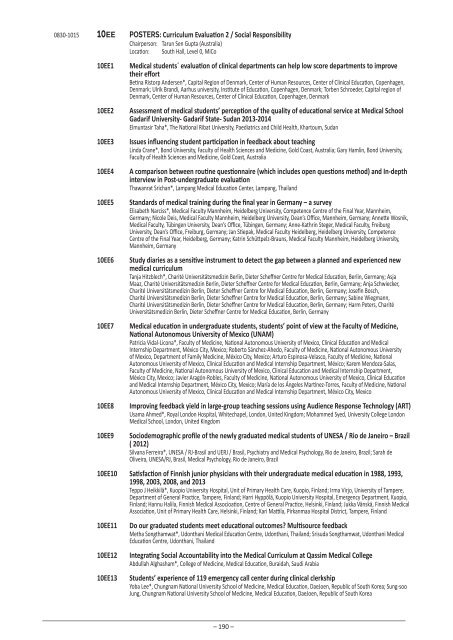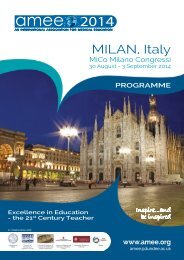AevJ1
AevJ1
AevJ1
Create successful ePaper yourself
Turn your PDF publications into a flip-book with our unique Google optimized e-Paper software.
0830-1015 10EE POSTERS: Curriculum Evaluation 2 / Social ResponsibilityChairperson: Tarun Sen Gupta (Australia)Location: South Hall, Level 0, MiCo10EE110EE210EE310EE410EE510EE610EE710EE810EE9Medical students´ evaluation of clinical departments can help low score departments to improvetheir effortBetina Ristorp Andersen*, Capital Region of Denmark, Center of Human Resources, Center of Clinical Education, Copenhagen,Denmark; Ulrik Brandi, Aarhus university, Institute of Education, Copenhagen, Denmark; Torben Schroeder, Capital region ofDenmark, Center of Human Resources, Center of Clinical Education, Copenhagen, DenmarkAssessment of medical students’ perception of the quality of educational service at Medical SchoolGadarif University- Gadarif State- Sudan 2013-2014Elmuntasir Taha*, The National Ribat University, Paediatrics and Child Health, Khartoum, SudanIssues influencing student participation in feedback about teachingLinda Crane*, Bond University, Faculty of Health Sciences and Medicine, Gold Coast, Australia; Gary Hamlin, Bond University,Faculty of Health Sciences and Medicine, Gold Coast, AustraliaA comparison between routine questionnaire (which includes open questions method) and In-depthinterview in Post-undergraduate evaluationThawanrat Srichan*, Lampang Medical Education Center, Lampang, ThailandStandards of medical training during the final year in Germany – a surveyElisabeth Narciss*, Medical Faculty Mannheim, Heidelberg University, Competence Centre of the Final Year, Mannheim,Germany; Nicole Deis, Medical Faculty Mannheim, Heidelberg University, Dean’s Office, Mannheim, Germany; Annette Wosnik,Medical Faculty, Tübingen University, Dean’s Office, Tübingen, Germany; Anne-Kathrin Steger, Medical Faculty, FreiburgUniversity, Dean’s Office, Freiburg, Germany; Jan Stiepak, Medical Faculty Heidelberg, Heidelberg University, CompetenceCentre of the Final Year, Heidelberg, Germany; Katrin Schüttpelz-Brauns, Medical Faculty Mannheim, Heidelberg University,Mannheim, GermanyStudy diaries as a sensitive instrument to detect the gap between a planned and experienced newmedical curriculumTanja Hitzblech*, Charité Universitätsmedizin Berlin, Dieter Scheffner Centre for Medical Education, Berlin, Germany; AsjaMaaz, Charité Universitätsmedizin Berlin, Dieter Scheffner Centre for Medical Education, Berlin, Germany; Anja Schwiecker,Charité Universitätsmedizin Berlin, Dieter Scheffner Centre for Medical Education, Berlin, Germany; Josefin Bosch,Charité Universitätsmedizin Berlin, Dieter Scheffner Centre for Medical Education, Berlin, Germany; Sabine Wiegmann,Charité Universitätsmedizin Berlin, Dieter Scheffner Centre for Medical Education, Berlin, Germany; Harm Peters, CharitéUniversitätsmedizin Berlin, Dieter Scheffner Centre for Medical Education, Berlin, GermanyMedical education in undergraduate students, students’ point of view at the Faculty of Medicine,National Autonomous University of Mexico (UNAM)Patricia Vidal-Licona*, Faculty of Medicine, National Autonomous University of Mexico, Clinical Education and MedicalInternship Department, México City, Mexico; Roberto Sánchez-Ahedo, Faculty of Medicine, National Autonomous Universityof Mexico, Department of Family Medicine, México City, Mexico; Arturo Espinosa-Velasco, Faculty of Medicine, NationalAutonomous University of Mexico, Clinical Education and Medical Internship Department, México; Karem Mendoza-Salas,Faculty of Medicine, National Autonomous University of Mexico, Clinical Education and Medical Internship Department,México City, Mexico; Javier Aragón-Robles, Faculty of Medicine, National Autonomous University of Mexico, Clinical Educationand Medical Internship Department, México City, Mexico; María de los Ángeles Martínez-Torres, Faculty of Medicine, NationalAutonomous University of Mexico, Clinical Education and Medical Internship Department, México City, MexicoImproving feedback yield in large-group teaching sessions using Audience Response Technology (ART)Usama Ahmed*, Royal London Hospital, Whitechapel, London, United Kingdom; Mohammed Syed, University College LondonMedical School, London, United KingdomSociodemographic profile of the newly graduated medical students of UNESA / Rio de Janeiro – Brazil( 2012)Silvana Ferreira*, UNESA / RJ-Brasil and UERJ / Brasil, Psychiatry and Medical Psychology, Rio de Janeiro, Brazil; Sarah deOliveira, UNESA/RJ, Brasil, Medical Psychology, Rio de Janeiro, Brazil10EE10 Satisfaction of Finnish junior physicians with their undergraduate medical education in 1988, 1993,1998, 2003, 2008, and 2013Teppo J Heikkilä*, Kuopio University Hospital, Unit of Primary Health Care, Kuopio, Finland; Irma Virjo, University of Tampere,Department of General Practice, Tampere, Finland; Harri Hyppölä, Kuopio University Hospital, Emergency Department, Kuopio,Finland; Hannu Halila, Finnish Medical Associoation, Centre of General Practice, Helsinki, Finland; Jukka Vänskä, Finnish MedicalAssociation, Unit of Primary Health Care, Helsinki, Finland; Kari Mattila, Pirkanmaa Hospital District, Tampere, Finland10EE1110EE1210EE13Do our graduated students meet educational outcomes? Multisource feedbackMetha Songthamwat*, Udonthani Medical Education Centre, Udonthani, Thailand; Srisuda Songthamwat, Udonthani MedicalEducation Centre, Udonthani, ThailandIntegrating Social Accountability into the Medical Curriculum at Qassim Medical CollegeAbdullah Alghasham*, College of Medicine, Medical Education, Buraidah, Saudi ArabiaStudents’ experience of 119 emergency call center during clinical clerkshipYoba Lee*, Chungnam National University School of Medicine, Medical Education, DaeJoen, Republic of South Korea; Sung-sooJung, Chungnam National University School of Medicine, Medical Education, DaeJoen, Republic of South Korea– 190 –



